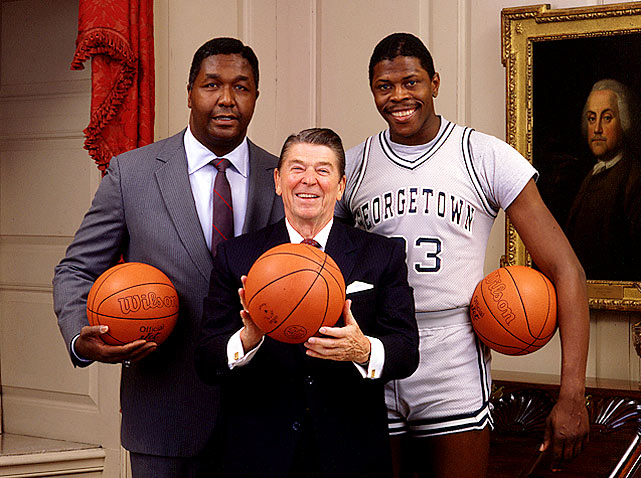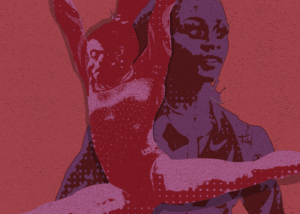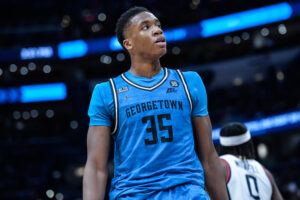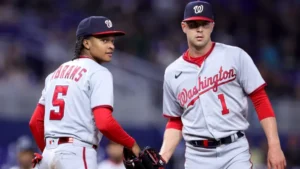In the United States, sports and politics go way back.
Larry O’Brien, NBA commissioner from 1975-1984 and namesake of the NBA Championship trophy, ran John F. Kennedy’s 1960 presidential campaign. O’Brien must have influenced Kennedy because in 1963, in the midst of the civil rights movement, the Bill Russell-led Boston Celtics became the first NBA team to visit the White House.
The tradition picked up steam when Ronald Reagan began welcoming sports champions in the early ’80s. NCAA champion and Georgetown alumnus Patrick Ewing (COL ’85) was one of the first to do so. Since then, the practice has continued with little disruption. There have been players who skipped the visits, such as the infamously private Larry Bird in 1984, but there is no precedent for entire teams deciding not to attend. There is so much dedication to the practice that despite the 1985 Chicago Bears missing their visit due to the Challenger space shuttle crash, President Obama re-invited them in 2011.
The NBA being a particularly progressive sports league, many questioned after Donald Trump’s election whether future NBA champions would honor the custom. LeBron James in particular was vocal in his support for presidential candidate Hillary Clinton. In a post-election interview he was asked how he would act if his team were to win the title during a Trump presidency James had not yet made up his mind.
This year, the Golden State Warriors took the title. In an interview last Friday, a reporter asked team captain Stephen Curry whether his team would honor the invitation. He responded, “It’s hard to say because I don’t know what exactly we’re gonna do.” But he made his personal stance very clear: “I don’t want to go.”
In response to Curry, Trump took to Twitter (as usual) on Saturday and said, “Going to the White House is considered a great honor for a championship team. Stephen Curry is hesitating, therefore invitation is withdrawn!” This prompted a slew of athletes and celebrities to weigh in on the issue. Most notably was LeBron, who, in a roast which is now the 23rd most retweeted and 10th most liked tweet of all time, pronounced the president a bum.
Curry’s actions paralleled other players’ protests. It has become a regular occurrence for a few NFL players to kneel during the national anthem in order to convey their belief that social injustices plague the US. Colin Kaepernick, who was the first to publicly protest using the national anthem, did so to raise awareness of police unfairly treating minorities. Initially, Kaepernick would sit during the anthem, but to show respect for our country and its military, he decided to take a knee instead. He explained his choice saying, “I love America. I love people. That’s why I’m doing this. I want to help make America better.”
On Friday, the president gave a speech in which lambasted protesting players – hoping for NFL owners to, “Get that son of a bitch off the field right now.” Trump continued his assault on Twitter by saying athletes should not be allowed to disrespect the flag by protesting while they enjoy American privileges.
Here, Trump took a peaceful protest where athletes displayed their frustrations in silent objection and made it out to be an affront to the United States. He attacked athletes who stood up, or knelt down, for what they believed in. And NFL players did not take this lightly.
When football Sunday came, the league demonstrated. The Steelers, Seahawks, and Titans were absent during the anthem. Hundreds of players knelt in protest or locked arms to show solidarity with their teammates. While many players and fans disagree with the anthem protests, many still consider the president’s comments inappropriate. Saints quarterback Drew Brees, who supports standing for the anthem, explained: “I disagree with what the president said and how he said it. I think it’s very unbecoming of the office of President of the United States to talk like that to the great people like that.”
Trump, however, persisted and requested that fans commence a boycott on the NFL. His rabid desire for players and citizens to blindly show respect for the American flag and national anthem stem from his misrepresentation of their efforts. He says that players are actively disrespecting the country. But a football player exercising his right to protest against social injustice is just about the most American thing I can think of. Giants Receiver Brandon Marshall put it succinctly, “I’m not against the military. I’m not against the police or America. I’m against social injustice.”
While it’s a testament to the American spirit that so many have come out in support of professional sports players, it’s important to remember the causes that these athletes are using their voices for. Carmelo Anthony has just raised over $300,000 for Puerto Ricans affected by Hurricane Maria, Tim Duncan has raised over $2 million and personally pledged another million for those in the U.S. Virgin Islands, Colin Kaepernick has given hundreds of thousands for social causes, and JJ Watt has raised over $35 million for Hurricane Harvey relief after the flooding in Houston.
Kneeling during an anthem does not make these athletes–these heroes–un-American.
Photo: Lane Stewart/Sports Illustrated





